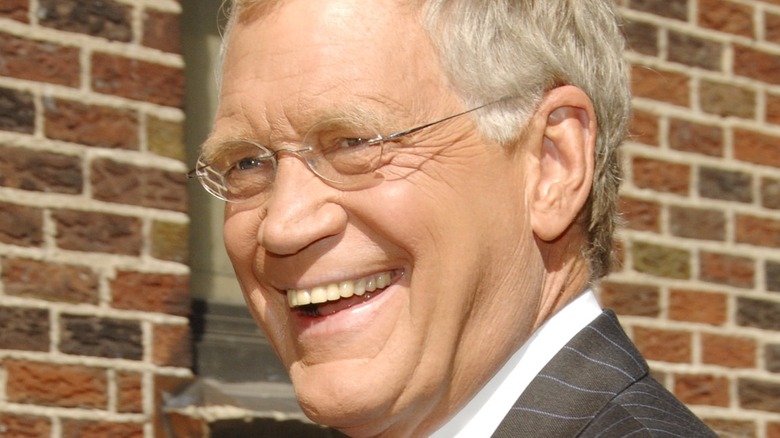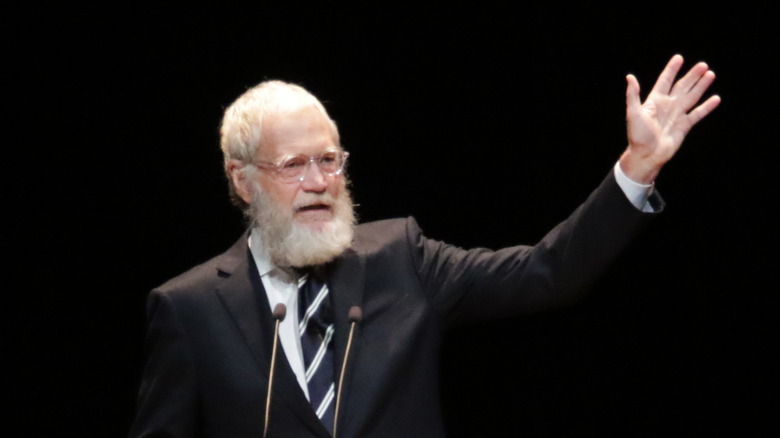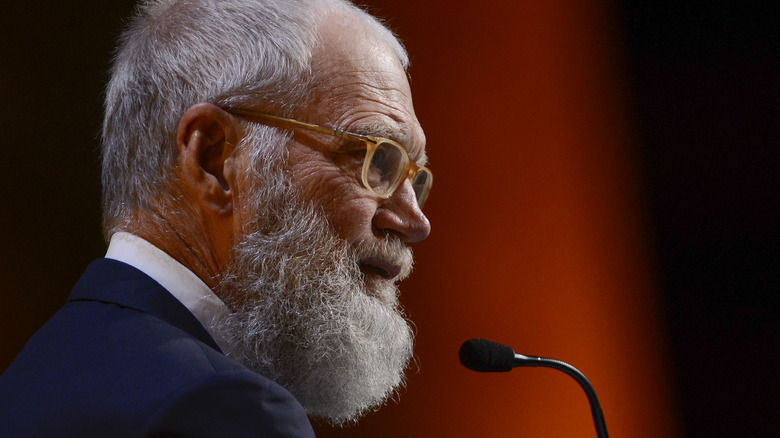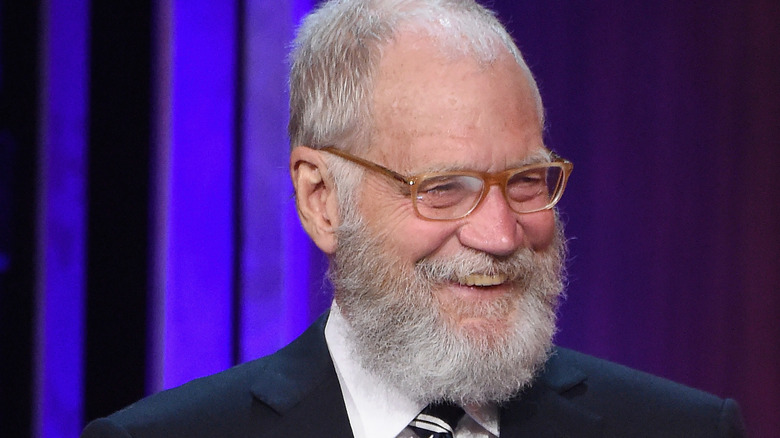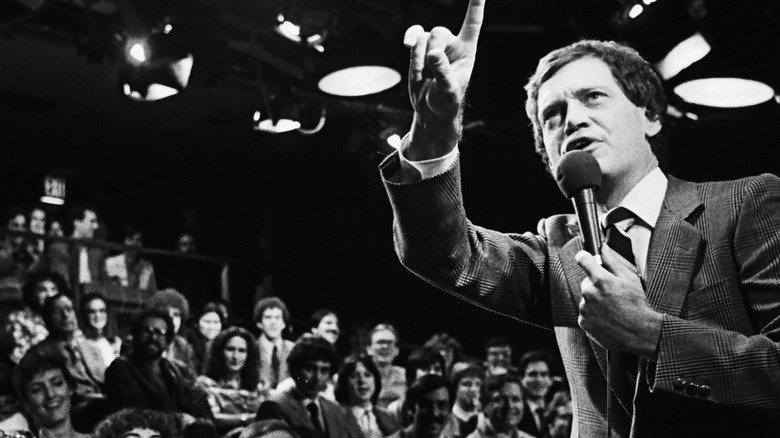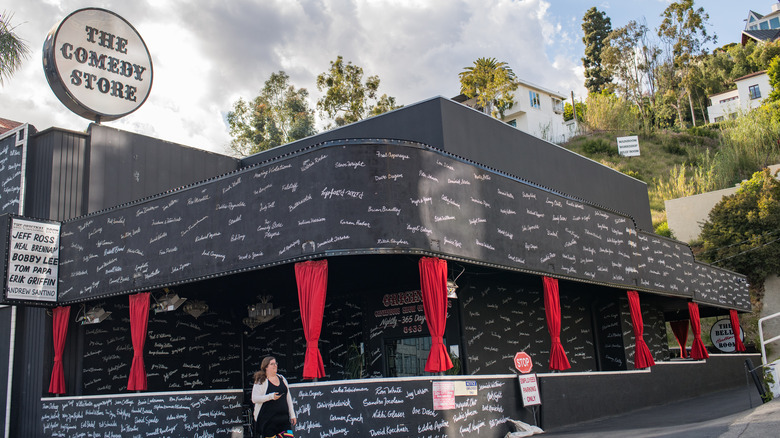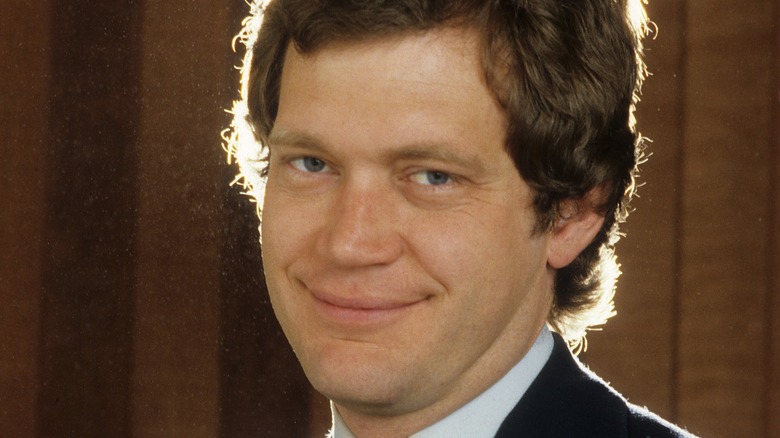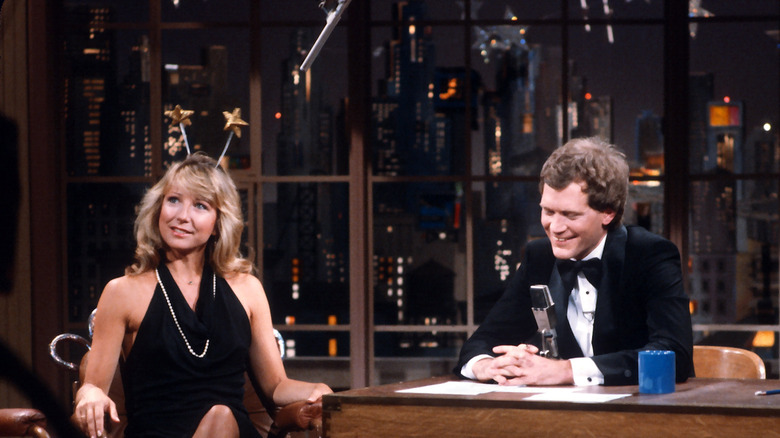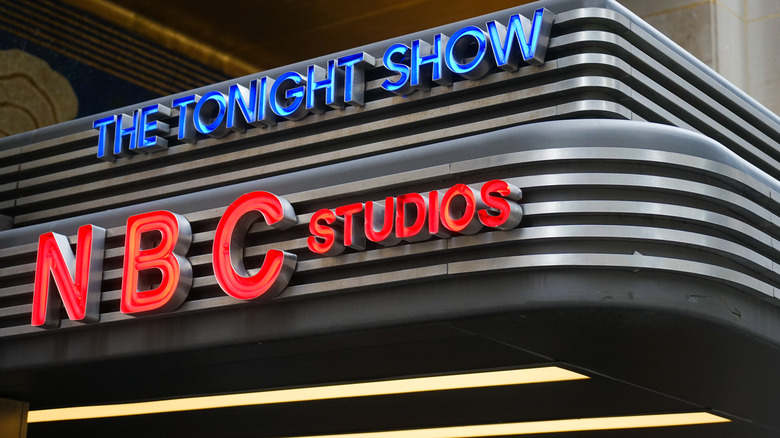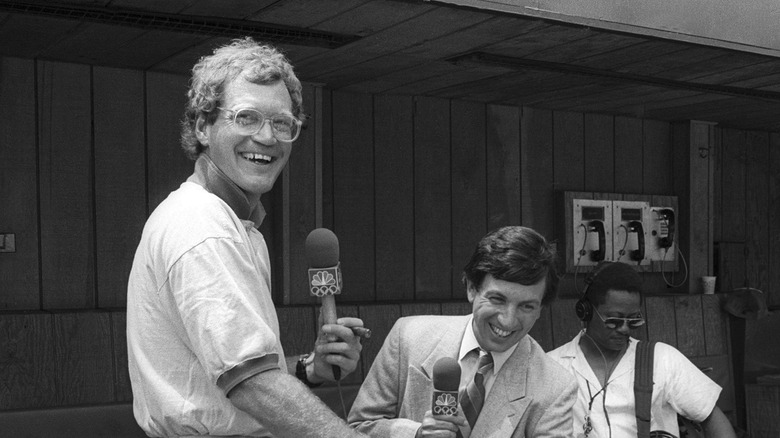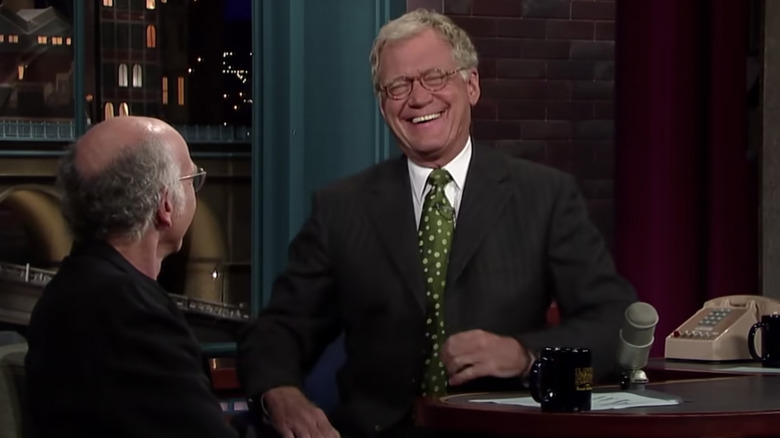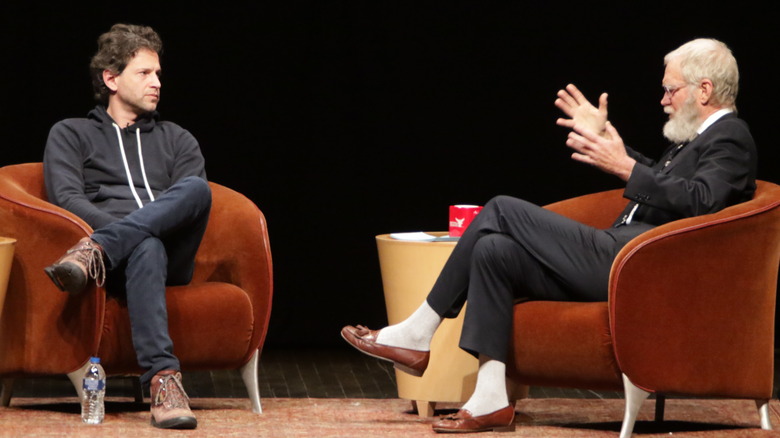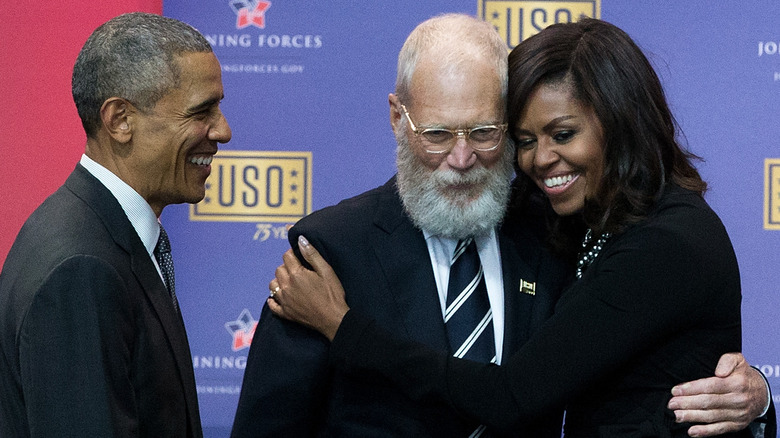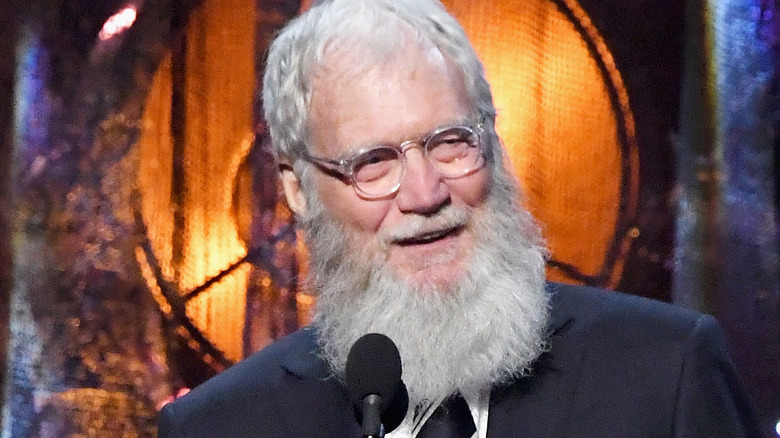David Letterman: From Indiana To Becoming An Icon
For more than three decades, comedian and host David Letterman appeared on television five nights a week to deliver dry, sarcastic monologues, interview celebrities, and introduce bits like the "Top Ten," "Small Town News," and "Stupid Pet Tricks." As described by Letterman's biographer Jason Zinoman for The New York Times, Letterman's approach to hosting a late-night talk show was extremely subversive, and at times closer to a searing parody of the entertainment industry than a talk show.
Letterman is famous for his willingness to make fun of anyone to their face while aiming his harshest jokes at himself. While he has a reputation for being ironic, irreverent, and willing to turn any serious moment into the opportunity for a joke, as time has gone by, Letterman has become respected for his willingness to be authentic and honest about himself, too. As noted by Vulture, Letterman moved on from "The Late Show" on CBS in 2015, leaving the landscape of late-night talk shows utterly different than he found it.
David Letterman wished his father had been in show business
David Letterman grew up in Indiana and no one in his life worked in comedy, or show business of any kind. His father, Harry Joseph Letterman, owned and ran a local flower shop — but Letterman now believes that his father should have been an entertainer, too: "My father could have easily done what I have done," Letterman said during an interview with Marc Maron, "and I wish he had."
Letterman explained that his father was not particularly good at business, but he was talented in other ways, including playing the piano and making those around him laugh. Letterman's father developed a problem with alcohol, something which Letterman attributes to his dissatisfaction with his life. While he was never in television like his son, Harry Letterman found his audience as the MC of local church functions and later in life, at AA meetings. According to Letterman, his father thrived when sharing at meetings, and would tell jokes to entertain the room: "He became president of the local AA group and he would run the meetings, and he would be the center of attention and he would have funny stories," Letterman said (via Bullseye), "It was always apparent that this was a need that he had and a skill that he was really good at."
If you or anyone you know needs help with addiction issues, help is available. Visit the Substance Abuse and Mental Health Services Administration website or contact SAMHSA's National Helpline at 1-800-662-HELP (4357).
He struggled with alcoholism when he was young
David Letterman has been very candid about his own struggles with alcohol. In an interview with Howard Stern, Letterman explained that at the age of 12, his father offered him a single sip of his scotch and soda at a Christmas party. From then on, he continued drinking regularly, in secret. Letterman explained that he knew his parents kept their whiskey under the sink, and after everyone else was asleep he would drink some.
On an episode of the podcast WTF with Marc Maron, Letterman explained that it was easy for him to be drunk regularly in high school and college, but that after college he started to notice that his peers weren't drinking as much as he was anymore. It began to take a toll on his physical health, and every year at his annual physical, doctors would warn him that his liver was swollen. Still, he struggled to quit.
Finally, at the age of 34, Letterman stopped drinking. As noted in the Howard Stern interview, Letterman was working on the "Late Night with David Letterman" on NBC, and he began to be concerned that his drinking would impact his career. In an interview with Howard Stern, he recalled thinking to himself, "I'm not only lucky to be on TV, I'm lucky to have a second chance to be on TV, and the last thing I want to do is be the reason this thing gets screwed up."
If you or anyone you know needs help with addiction issues, help is available. Visit the Substance Abuse and Mental Health Services Administration website or contact SAMHSA's National Helpline at 1-800-662-HELP (4357).
His irreverent humor got him into trouble at first
David Letterman's unique sense of humor attracted attention and helped him get his first gigs — but it also got him into trouble. In an interview with CBS, former Ball State radio manager Al Rent explained that back in 1968, they recognized that Letterman was clever and funny right away, and thought he would be perfect for hosting a radio show.
What they didn't expect was for Letterman to infuse the program with his sense of humor. Letterman was hired to write about the life stories of classical composers to present on the air, but he had a hard time sticking to the facts: "Every biography he wrote, he tended to embellish and change the composer's lifestyle. Such as Claude Debussy," recalled Rent, "Letterman's line was, a little known fact was Claude wrote a song for Clair de Lune and all their little loons."
Letterman was reassigned from that particular job at the station, but his irreverent humor would soon make him a hit at Indianapolis TV station WLWI-TV, Channel 13. As described by CBS, he hosted a weekend children's show and a late-night movie show, where he served as a weatherman — with vivid, if not entirely accurate, descriptions of upcoming weather.
David Letterman used to be afraid of public speaking
David Letterman is now famous for delivering his monologues every night in front of a live studio audience, but before becoming a staple of late-night, young Letterman hated public speaking. Before he moved to Los Angeles, Letterman worked in radio and local TV. As described by Letterman on WTF with Marc Maron, he was often asked to do appearances and speak at live events. Letterman admitted, "It used to petrify me to have to go out and be in front of audiences."
At the time, young Letterman went out of his way to avoid ever having to do in-person appearances where he might be required to speak to the audience. He recalled that when he eventually moved to L.A., he realized that he had signed himself up to do something he had been avoiding his entire professional career, saying, "I am now about to go back into the very thing that scared me to death — which was trying to make strangers laugh."
David Letterman got his start at The Comedy Store
Less than two weeks after moving to Los Angeles, David Letterman went to the famous comedy club, The Comedy Store. Letterman told Marc Maron on his podcast that "[The Comedy Store] was completely exciting, and completely different from anything culturally or socially I had been a part of in Indiana."
As Letterman described for Showtime, when he first went on at The Comedy Store, he didn't have a set prepared. The club's owner, Mitzi, invited Letterman to come back and go on again. But when he returned the following week, he checked the list of comics scheduled to perform and found his name wasn't on the list. For the next week, he was devastated and believed that Shore had changed her mind. Eventually, a friend told him that he had to actually call the club to get a time slot.
Many of the very first people that Letterman met upon arriving in L.A. and getting involved in stand-up became lifelong collaborators and frequent guests on his future TV shows. As Letterman explained on WTF with Marc Maron, he frequently performed alongside other comedians, including Tom Dreeson, George Miller, Jeff Altman, Jay Leno, and Robin Williams.
He was a guest on The Tonight Show with Johnny Carson 22 times
As a child growing up in Indiana, David Letterman had been a massive fan of "The Tonight Show" starring Johnny Carson. As noted by The Guardian, as Letterman grew older, he had harbored a secret dream of someday hosting the show himself.
After moving to L.A., Letterman's sets at The Comedy Store got him noticed by executives, and he began working as a comedy writer and a presenter on game shows. But as noted by KRQE, the majority of Americans were introduced to David Letterman on Carson's show. On November 24, 1978, Letterman came on Carson's show and did a set for the very first time. As described by The Guardian, Letterman managed to make Carson laugh with a joke about not changing dog food to fix his dog's constipation, with the punchline, "Why screw up a good thing?" He would become a regular guest host on Carson's late-night show, hosting it 50 times.
David Letterman's early shows were unique
David Letterman's first TV show wasn't a late-night show, it was actually a live morning show titled, "The David Letterman Show." As described by Esquire, the program was only on the air for about four months. Despite how brief it was, "The David Letterman Show" showcased Letterman's unique brand of humor.
Many of Letterman's most beloved bits began on the live show, including Small Town News, during which Letterman read unexpected and amusing headlines and ads pulled from local newspapers. Along with featuring many guests who would go on to appear on Letterman's later shows, behind the scenes many of the creative collaborators were the same, too, including Merrill Markoe, Hal Gurnee, Bill Wendell, Barbara Gaines, and Biff Henderson.
From the very first episode of "Late Night" with David Letterman, which aired on NBC, it was obvious that Letterman's show was going to be different from other talk shows, just as his morning show had stood alone in the landscape of other morning shows airing at the time. As described by Entertainment Weekly, the first episode of "Late Night" featured an extremely ominous, horror-tinged opening monologue, Bill Murray performing "Let's Get Physical," and Letterman interviewing random New Yorkers on the street, including a police officer working out of a tiny station and a restaurant employee who misspelled something.
NBC didn't want David Letterman taking over The Tonight Show
Many people assumed that after Johnny Carson retired, Letterman would take over NBC's "The Tonight Show." As described by KRQE, not only had he guest-hosted the show many times, he hosted his talk show immediately after Carson's "Late Night." The network, however, was planning to install another frequent guest host: Jay Leno.
According to People, when Leno signed a contract to continue guest hosting, his new deal included a guarantee that he would be the next host of "The Tonight Show" whenever Carson chose to retire. As described by The Guardian, the network also felt that Letterman was unpredictable. Rick Ludwin, former vice-president of NBC, stated that he thought that Letterman was "bothersome and draining, and ... could be unnecessarily rude to network people," which pushed him not to choose Letterman, even if he was Carson's apparent successor.
Carson retired in 1992. Letterman, who had always dreamed of being the regular host of "The Tonight Show," was devastated to discover he had unexpectedly been passed over for the job and believed that it was the end of his career. Even though he was still the host of "Late Night" and multiple other networks wanted him to host a show on their networks, the loss of "The Tonight Show" haunted Letterman.
David Letterman became an institution of television while mocking it
While it wasn't as widely watched as "The Tonight Show" directly before it, "Late Night" may have been more culturally significant. As a host, David Letterman fell perfectly into the zeitgeist, which was increasingly ironic, sarcastic, and self-aware.
"Late Night" began by satirizing entertainment, and the idea of talk shows in general. As described by Vulture, over the years it developed its own comedic language, which included recurring bits like the sound of shattering glass playing as Letterman threw crumpled up balls of paper at the fake window behind the desk; absurd bits like "Trump or Monkey" which featured random New Yorkers attempting to determine whether a photo of the top of a head belonged to Donald Trump or an ape; and meta jokes, like Letterman and band leader Paul Shaffer arguing about whether or not the show they were currently on was a rerun.
Biographer Jason Zinoman writes in "Letterman," (via Time), "[Letterman] had gradually turned into a fascinatingly disgruntled eccentric trapped inside a more traditional talk show." After losing out to Jay Leno for "The Tonight Show," Letterman's cultural impact only continued to grow. Letterman's shows were in many ways rejecting the concept of commercial entertainment, but over time, Letterman became an institution of television.
David Letterman's interview style was controversial
David Letterman seemed to reject the entertainment industry on his shows, often satirizing the idea of celebrity culture. However, it was still a talk show, and he would interview celebrities who were promoting upcoming films, albums, and TV shows in every episode. As noted by Letterman biographer Jason Zinoman (via The New York Times), when Letterman interviewed celebrities, he often seemed not to care about what they were promoting and sometimes seemed to be mocking his guests to their faces.
As detailed by Newsweek, Letterman didn't make small talk and compliment his guests the way some celebrity interviewers did, He preferred to riff with them, making jokes that were sometimes at the expense of his guest. In some cases, viewers felt that he went too far, coming across as disrespectful and rude rather than funny and challenging.
Letterman's more modern interviews began to take on a different tactic. As noted by Zinoman, on Letterman's current Netflix show, "My Next Guest Needs No Introduction," his interview style is highly different from what fans of his earlier shows had come to expect. They are more genuine, as Letterman unironically investigates the lives of his guests.
He put his real life on the air
David Letterman often used his personal life as a source of his trademark self-deprecating humor, but on rare occasions, he would put his own private life on the air in a vulnerable and genuine way. Letterman's mother, Dorothy, was a regular on the show, particularly for holidays like Mother's Day. As described by IndyStar, she frequently appeared remotely from her kitchen around Thanksgiving, so Letterman could attempt to guess what type of pie she had made to have with the holiday dinner.
Not all of the elements of his private life that were discussed on Letterman's show were as positive. As recounted by The New York Times in 2009, Letterman apologized to his wife and everyone who worked on "The Late Show," after someone had attempted to blackmail him by threatening to reveal the details of romantic relationships he had with members of his staff. As reported by The Washington Post in 2000, Letterman also brought his six doctors and two nurses on to thank them for saving his life after he had to have emergency quintuple bypass heart surgery.
On Larry King Live (via CNN), Time magazine editor Richard Zoglin said that Letterman was a "very private person," but "over the years, what's made David Letterman a fascinating TV personality is how he's allowed us these little peeks into his private life and he's become a more human sort of person, not Mr. Irony, as he started out to be."
David Letterman interviewed Barack Obama
Letterman retired from "The Late Show" in 2015, but by 2018 he was back with a new show, this time on Netflix and sporting an impressively large beard. His first guest was former president Barack Obama, who was being interviewed for the first time after leaving office.
As described by Vulture, the episode features Obama and Letterman speaking on everything from what his life has become after the presidency, his family, poverty and income inequality, technology, and how the civil rights movement inspired him to get into politics in the first place. The episode even features photos of Letterman with civil rights leader John Lewis before his death.
Letterman biographer Jason Zinoman (via The New York Times), notes that Letterman's new show is a notable departure from his previous work. Letterman's approach to his modern interviews is genuine and sensitive, without the irony that had been his trademark.
He left a late-night legacy
For more than three decades, David Letterman appeared on his audience's television five nights a week. As described by The New York Times, he has had a profound impact on the current landscape of late-night, but no current host has matched the disdain young Letterman had for commercial entertainment or his penchant for self-deprecating jokes. As Letterman has aged and become more sincere, he has kept the dry wit that made him a beloved staple of late night.
Many (including ABC) have credited Letterman with paving the way for irreverent sarcastic talk-show hosts like Jon Stewart and Stephen Colbert to deliver the news with a side of snark. He may have been devastated to have lost the opportunity to host "The Tonight Show," as noted by Vulture, but Letterman's lateral move to host "The Late Show" for CBS actually ended up proving that other late-night shows could thrive — even up against "The Tonight Show."
